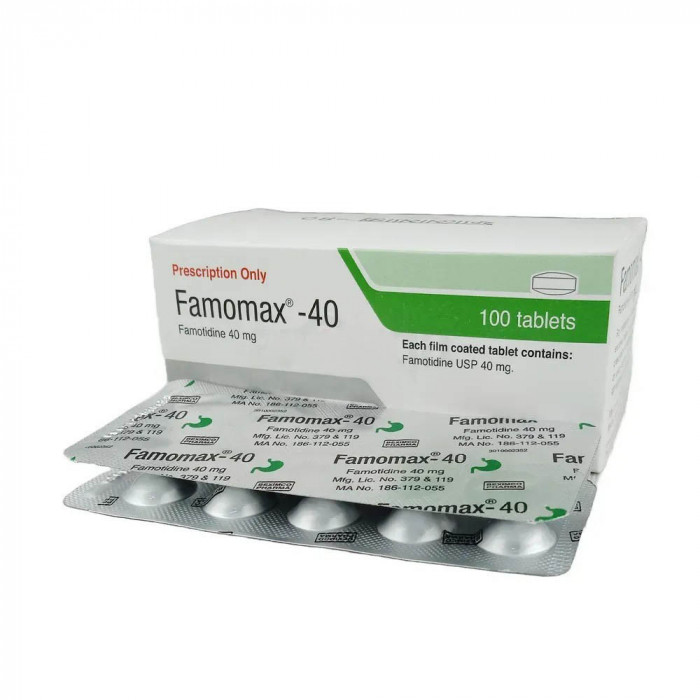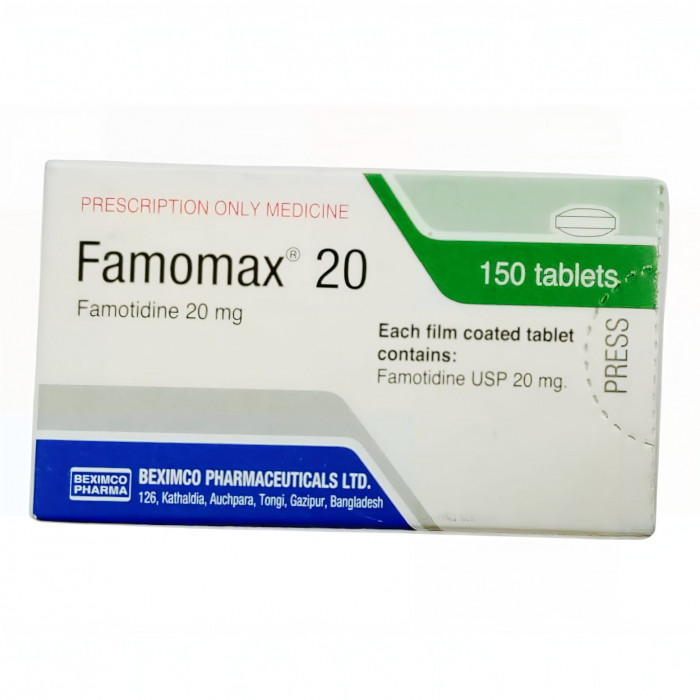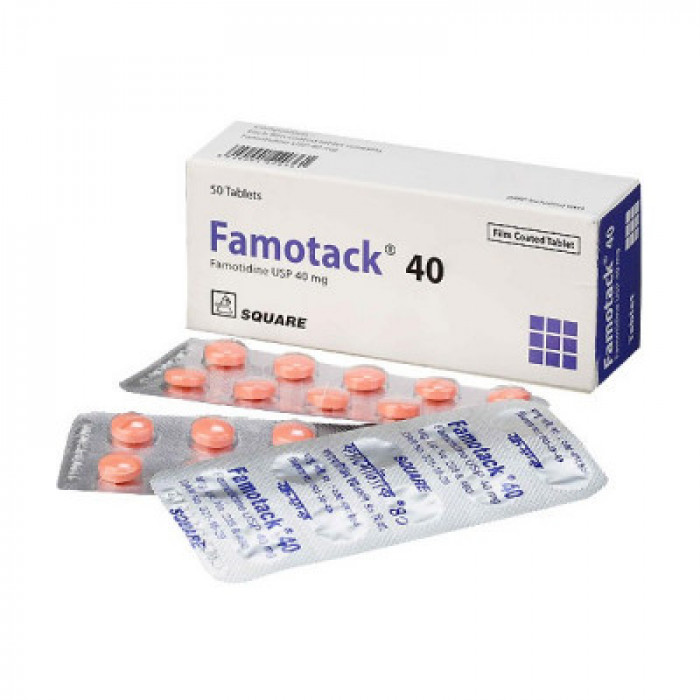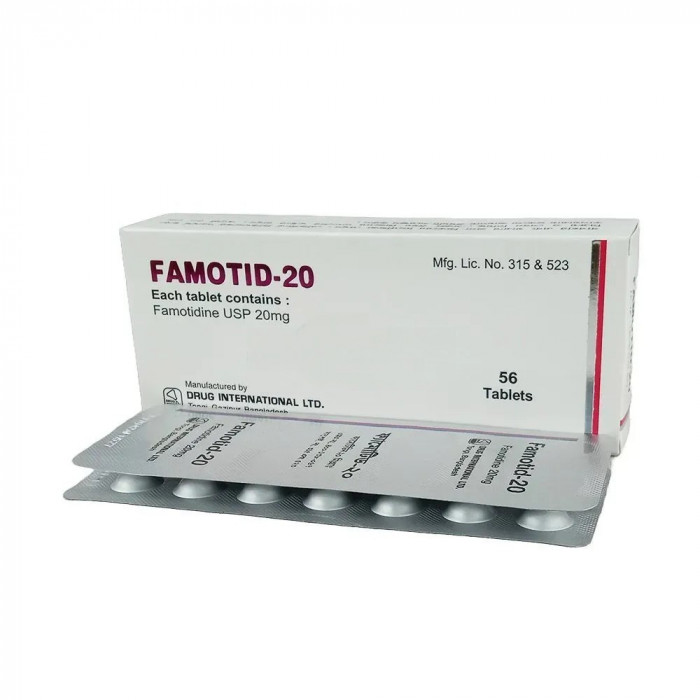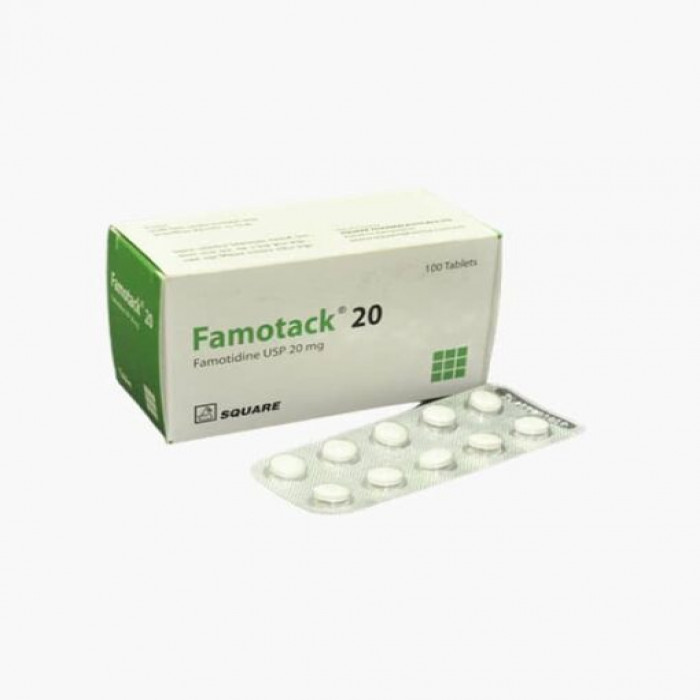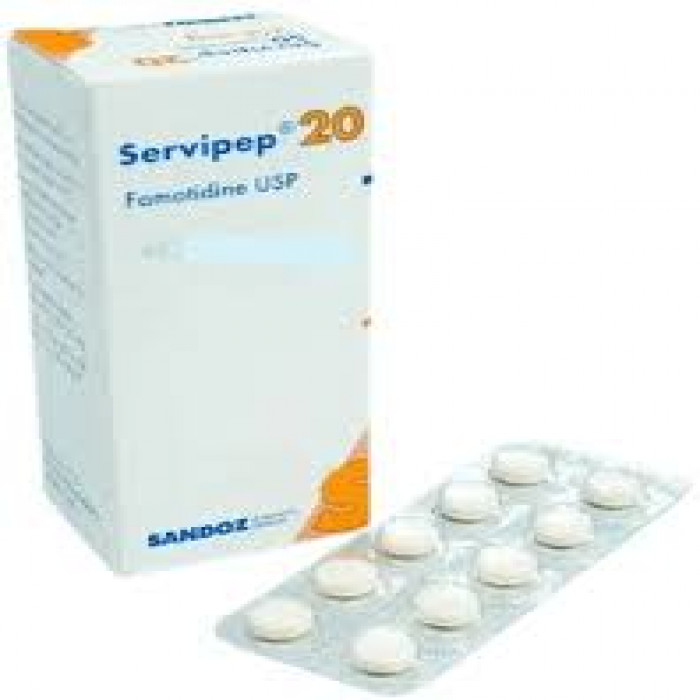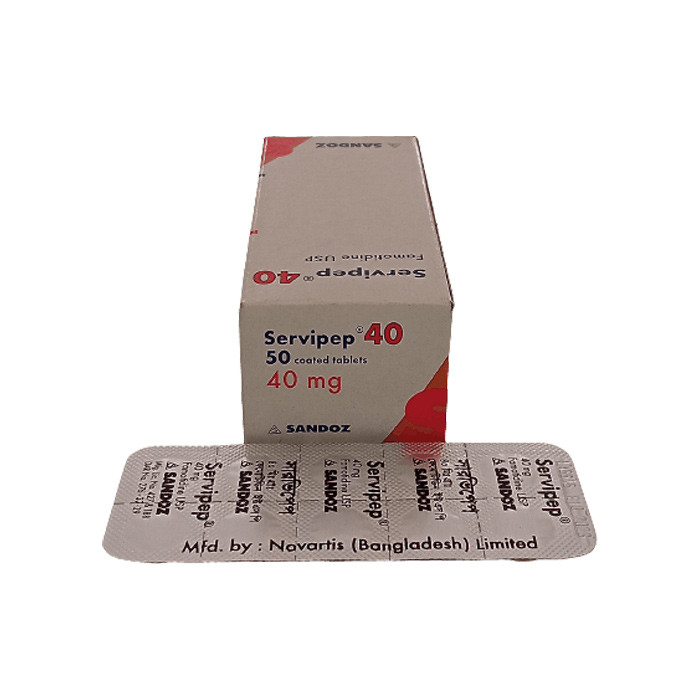
✔ 100% Authentic Product
👁️ Currently Viewing 2382
Famotidine treats gastroesophageal reflux disease (acid reflux), peptic ulcer disease, and heartburn.
Discount
Price: ৳ 60
MRP:
৳
62
4%
Off

100% Genuine Products, Guaranteed

Safe & Secure Payments, Always

Fast, Secure & Efficient Delivery

Proper Packaging
 Cash on Delivery - All over Bangladesh
Cash on Delivery - All over Bangladesh Regular Delivery - 12-24 Hours, Dhaka City* Charge Tk.39-59
Regular Delivery - 12-24 Hours, Dhaka City* Charge Tk.39-59 Regular Delivery - 24-48 Hours, Other Cities* Charge Tk.99-110
Regular Delivery - 24-48 Hours, Other Cities* Charge Tk.99-110
 ফ্রি ডেলিভারিঃ - ৯৯৯ টাকা+ অর্ডারে, ঢাকা
শহরে
ফ্রি ডেলিভারিঃ - ৯৯৯ টাকা+ অর্ডারে, ঢাকা
শহরে ফ্রি ডেলিভারিঃ - ২৯৯৯ টাকা+ অর্ডারে, ঢাকার
বাহিরে
ফ্রি ডেলিভারিঃ - ২৯৯৯ টাকা+ অর্ডারে, ঢাকার
বাহিরে
100% Genuine Products, Guaranteed
Safe & Secure Payments, Always
Fast, Secure & Efficient Delivery
Proper Packaging
 Cash on Delivery - All over Bangladesh
Cash on Delivery - All over Bangladesh Regular Delivery - 12-24 Hours, Dhaka City* Charge Tk.39-59
Regular Delivery - 12-24 Hours, Dhaka City* Charge Tk.39-59 Regular Delivery - 24-48 Hours, Other Cities* Charge Tk.99-110
Regular Delivery - 24-48 Hours, Other Cities* Charge Tk.99-110 ফ্রি ডেলিভারিঃ - ৯৯৯ টাকা+ অর্ডারে, ঢাকা
শহরে
ফ্রি ডেলিভারিঃ - ৯৯৯ টাকা+ অর্ডারে, ঢাকা
শহরে ফ্রি ডেলিভারিঃ - ২৯৯৯ টাকা+ অর্ডারে, ঢাকার
বাহিরে
ফ্রি ডেলিভারিঃ - ২৯৯৯ টাকা+ অর্ডারে, ঢাকার
বাহিরে
✅ Description:
Servipep 40mg Tablet, containing Famotidine, is classified under H2 receptor antagonists and is utilized for addressing conditions such as stomach ulcers (gastric/duodenal ulcers), reflux esophagitis (irritation and inflammation due to stomach acid flowing back into the esophagus), and Zollinger-Ellison syndrome (characterized by recurring tumors and ulcers in the stomach and intestines).
Your doctor may recommend adequate rest and increased fluid intake alongside Servipep 40mg Tablet. Opting for simple, non-spicy foods and avoiding oily meals could also prove beneficial. Prior to initiating treatment with Servipep 40mg Tablet, it's essential to disclose any existing kidney ailments, stomach tumors, or intolerance to specific sugars to your doctor.
Safety Advices

Alcohol
UNSAFE
Servipep 40mg Tablet may interact with alcohol, increasing the risk of side effects. It's advisable to avoid alcohol consumption while taking this medication.

Pregnancy
CONSULT YOUR DOCTOR
Servipep 40mg Tablet is categorized as a category B medicine. It should only be used during pregnancy if prescribed by a doctor, weighing the potential benefits against the risks to the mother and fetus.

Breastfeeding
CONSULT YOUR DOCTOR
Servipep 40mg Tablet is excreted in breast milk and may pose risks to the nursing infant. Therefore, it is considered unsafe for breastfeeding mothers and should be avoided unless prescribed by a doctor.

Driving
SAFE
Servipep 40mg Tablet may cause dizziness and headache as side effects. Therefore, it's recommended to avoid driving or operating heavy machinery after taking this medication to prevent any accidents.

Kidney
CAUTION
Servipep 40mg Tablet should be used with caution in patients with kidney diseases. Dose adjustments may be necessary, and it's important to follow the doctor's instructions carefully

Liver
CAUTION
Caution should be exercised when using Servipep 40mg Tablet in patients with liver diseases. It is advisable to use this medication only under the guidance of a doctor in such cases.
✔️ Uses of Servipep 40mg Tablet
Treatment of Stomach ulcers, reflux oesophagitis, and Zollinger-Ellison syndrome
✔️ How does Servipep 40mg Tablet work?
It works by blocking the secretion of excess gastric acid thereby reducing the amount of acid in the stomach.
✔️ Side Effects of Servipep 40mg Tablet
- Headache
- Dizziness
- Constipation
- Diarrhea
✔️ Quick Suggestions:
- You can take famotidine with or without food, as directed by your doctor.
- If you're also taking other medications to treat acidity, such as antacids, it's recommended to take them at least 2 hours before or after taking famotidine. This helps prevent any potential interactions between the medications.
- Avoid consuming soft drinks and citrus fruits like oranges and lemons, as they can irritate the stomach and increase acid secretion, counteracting the effects of famotidine.
- If you do not experience relief from your symptoms after taking famotidine for 2 weeks, it's important to inform your doctor. Persistent symptoms may indicate underlying issues that need further evaluation and treatment.
- Inform your doctor if you have been diagnosed with kidney disease. Depending on the severity of your condition, the dose of famotidine may need to be adjusted to ensure safety and effectiveness.
- Do not stop taking famotidine abruptly without consulting your doctor. It's important to follow your doctor's instructions regarding the duration of treatment and any tapering off schedule to avoid potential rebound effects or recurrence of symptoms.
✔️ Indication of Servipep 40mg Tablet
Servipep is indicated in
- Gastric ulcer
- Duodenal ulcer
- Anastomotic ulcer
- Acute stress ulcer
- Reflux esophagitis and
- Zollinger-Ellison syndrome.
✔️ Pharmacology
Famotidine acts as a histamine H2-receptor antagonist, meaning it blocks the action of histamine on H2-receptors located on parietal cells in the stomach. By doing so, famotidine effectively inhibits the secretion of gastric acid in various conditions.
It exerts its inhibitory effects on gastric acid secretion in several ways:
- Basal Inhibition: Famotidine reduces the secretion of gastric acid during periods of rest or fasting, known as basal acid secretion.
- Overnight Inhibition: It continues to suppress gastric acid production during the night when acid secretion is typically higher due to reduced food intake.
- Pentagastrin Stimulation Inhibition: Famotidine also blocks the increase in gastric acid secretion stimulated by pentagastrin, a synthetic hormone that mimics the action of gastrin, a natural hormone that stimulates acid secretion in the stomach.
Additionally, famotidine's binding to H2-receptors is slowly reversible, meaning that it remains bound to the receptors for an extended period before dissociating. This slow dissociation contributes to its long-lasting effects on reducing gastric acid secretion.
✔️ Dosage & Administration of Servipep 40mg Tablet
Gastric ulcer, duodenal ulcer, anastomotic ulcer, upper gastrointestinal hemorrhage, reflux esophagitis, and Zollinger-Ellison syndrome:
- Adults: Famotidine 20 mg twice daily (after breakfast and after supper or before bedtime).
- Alternatively, Famotidine 40 mg can be orally administered once daily at bedtime.
Acute gastritis, chronic gastritis in acute exacerbation stage:
- Adults: Famotidine 20 mg orally twice a day (after breakfast and after supper or before bedtime).
- Alternatively, Famotidine 40 mg can be orally administered once a day before bedtime. Dosage should be adjusted according to age and symptoms.
Maintenance Therapy:
- The recommended oral dose for most ulcer patients for maintenance therapy is 20 mg once daily.
- Dosage adjustments should be made as directed by the registered physician.
✔️ Interaction
Drug Interactions:
- Servipep 40mg Tablet may interact with various medications including antacids, antifungal drugs (ketoconazole and itraconazole), medications for hepatitis C (Ledipasvir / Sofosbuvir), leukemia treatments (nilotinib, dasatinib), antibiotic drugs (cefditoren), and HIV medications (rilpivirine, fosamprenavir).
- There can be interactions between Servipep 40mg Tablet and alcohol, potentially increasing the risk of side effects.
Drug-Disease Interactions:
- Use Servipep 40mg Tablet cautiously in patients with gastrointestinal bleeding, lactose intolerance, H. pylori infection, and renal dysfunction.
✔️ Contraindications
- Servipep 40mg Tablet is contraindicated in children and breastfeeding mothers.
- Avoid taking Servipep 40mg Tablet if you have a known allergy to famotidine, other H2 receptor antagonists, or any of its ingredients.
✔️ Pregnancy & Lactation
Pregnancy category B. There are no adequate and well-controlled studies in pregnant women. This drug should be used during pregnancy only if clearly needed. Caution should be exercised when Famotid is administered to a nursing woman.
✔️ Precautions & Warnings
- Inform your doctor about any gastrointestinal problems, Helicobacter pylori infection, lactose intolerance, or kidney diseases before using Servipep 40mg Tablet.
- Notify your doctor if you are pregnant or planning to become pregnant.
✔️ Storage Conditions:
Store in a cool and dry place away from sunlight
⚠️Disclaimer:
At ePharma, we’re committed to providing accurate and accessible health information. However, all content is intended for informational purposes only and should not replace medical advice from a qualified physician. Please consult your healthcare provider for personalized guidance. We aim to support, not substitute, the doctor-patient relationship.




